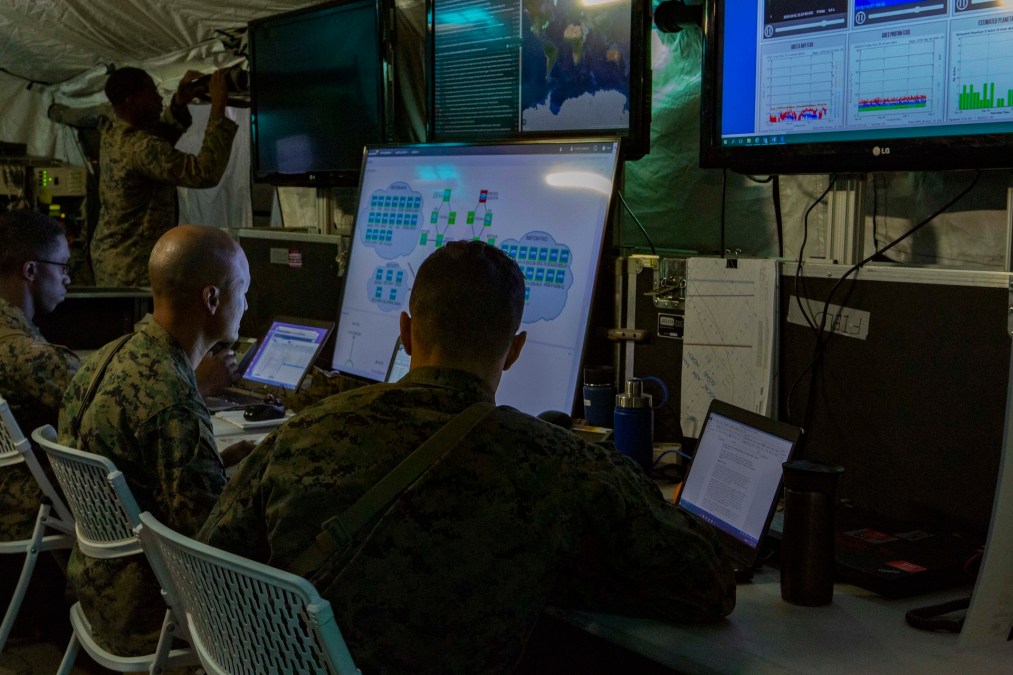Marine Corps deploys cyber personnel to Pacific for enduring defense mission

The Marines recently sent cyber personnel to Okinawa, Japan, as part of a recurring effort to harden networks and critical infrastructure.
The so-called cyber rotational force concept aims to bring experts from Marine Corps Forces Cyberspace Command into theater to assist units with bolstering networks. The assemblage — made up of personnel from the Marine Corps Cyberspace Warfare Group, which plans and conducts full spectrum cyberspace ops, and its subordinate unit known as the Marine Corps Cyberspace Operations Battalion — recently joined forces with local cyber Marines from III Marine Expeditionary Force in Japan.
A spokesperson from MARFORCYBER couldn’t specify the exact number of people on the team, but noted it is task organized with both uniformed and civilian subject matter experts.
The teams will conduct what the military calls defensive cyberspace operations-internal defense measures — specific actions taken in response to either intelligence, a threat or an incident, as opposed to operations that are executed daily as part of running a network — focusing on the hardening of IT infrastructure in the region, the spokesperson said.
The concept is part of an ongoing effort to survey, assess and harden critical infrastructure with the goal of making it an enduring rotation with some variance in the physical locations across the Indo-Pacific Command region.
Indo-Pacom has become the priority theater as the Pentagon views China as its “pacing threat.” The Marines are at the forefront of this effort, acting as a so-called “stand-in force” within the enemy’s “weapons engagement zone.” This means being present in the region at all times to be able to assist partners and be prepared if conflict were to break out by shaping the battlespace. They exist inside the range of enemy weapons, eschewing the need to fight to get to the fight, as military officials describe it.
As China continues its aggressive action in the region and elsewhere, U.S. and partner infrastructure will continue to be undermined — making concerted efforts to bolster those networks and infrastructure paramount.
“Protecting critical networks located inside the weapons engagement zone of several regional adversaries is essential to our ability to physically and virtually maneuver,” Lt. Gen. William Jurney, commander of U.S. Marine Corps Forces, Pacific, said in a release. “We are excited to work with MARFORCYBER on the cyber rotational force concept and look forward to the resilience and flexibility their experts can provide our force.”
The Corps also sees these deployments initially as a chance to improve its tactics in the digital realm to harden networks, if and when needed, against sophisticated adversities in potential future conflicts.
Static and tactical networks will be held at risk by foes, and these deployments will be opportunities to refine how to protect and defend them.
“As the threat to our critical cyber infrastructure evolves, it is essential that the Marine Corps be able to defend our forward deployed networks,” Jurney said. “This will be crucial to the Marine Corps’ development of the expeditionary advance basing and stand-in force concepts.”
The service is also in the process of modernizing its network, working to consolidate enterprise and tactical systems while focusing on data centricity, or getting the right data to the right place to enable faster decision-making.
This paradigm shift, officials believe, will also make the network more resilient in the face of sophisticated adversary attacks and enable data to flow more efficiently in times of duress and crisis.



